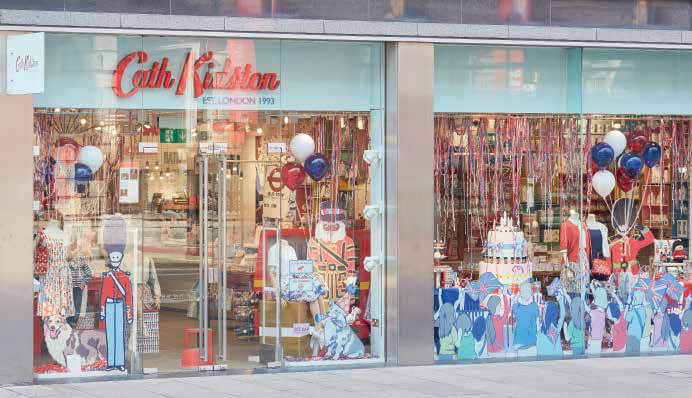Devalued brands
Speculation on how Brexit will affect British brands that do business in Europe has tended to focus on the decimation of sterling. On the one hand, it makes the import of raw materials more costly. On the other, it reduces the price of the finished items to European customers.
The consensus is that improved market competitiveness more than makes up for the increased cost of goods. Customers buying in euros will effectively be purchasing British brands for something in the region of 10-15% less, thanks to beneficial exchange rates, and sales should be buoyant as a result.
Well, a discount is always a way of stimulating short-term demand, but every marketer will know that it is no way to sustain things for the long term. In the end, reductions only work if they apply to brands people desire in the first place. Should brand appeal dilute, the financial come-on gets decoded as desperation – a turn-off, even. A Burberry trench coat at 15% off normal price is attractive just so long as you crave ownership of a Burberry. If not, no amount of discounting will make you reach for that famous British check.
That sets up the more subtle question of how Brexit affects British brands in Europe at the strictly perceptual level. This is much harder to predict – though it won’t stop me from trying – but one thing is clear: whatever the effects, they will be more extreme for brands with Britishness encoded in their values and associations than for brands that merely happen to emanate from these shores. More marked, in other words, for Paul Smith, Topshop, Rimmel, Cath Kidston, Hunter, the BBC and Burberry than for, say, Dyson or Tate & Lyle.
To link a brand to the associations of a country is always to be a hostage to fortune. It’s bad enough hitching brand meaning to a celebrity when – heaven knows – they can do crazy things, but at least there you have a contract and a get-out clause. Over an entire nation, you have no control and no way to wriggle free when it does something that enrages or dismays the wider world. The most obvious risk is boycott, when the country engages in military action or becomes tainted with political scandal. British and US brands were vulnerable during the Iraq war. Denmark saw its brands shunned in Muslim countries as a response to the cartoons depicting the prophet in its leading national newspaper.
It’s possible that consumers in Europe may informally banish our brands in protest at the economic and social upheaval that Brexit has wreaked. But that isn’t the main concern. Boycotts tend to be limited to small, albeit vociferous, minorities and reflect a considered, bounded reaction of people who might nevertheless find the brands attractive.
Far more worrying is when perceptions of a country – and therefore the brands highly associated with it – morph into something faintly ridiculous and uncool.

That’s the danger here. For decades, Britishness has translated as a desirable amalgam of creativity, irreverence and edginess founded on – and made possible by – an underlying steadfastness and solidity.
It’s the combination that made “Union Jack” brands attractive: rooted and outgoing; serious and not. Britishness could afford to laugh at itself because its confidence sprang from a deep well of stability. Not now. Scratch away the jokiness on the surface and you reveal a real joke underneath. Our closest and most valuable customers have noticed and, in their social and mainstream media, they are laughing at, not with, us.
First we leave the union, then our leaders leave their posts. For a while, it looks certain we will make a buffoon our prime minister. It’s clear that we didn’t expect this result and don’t have the semblance of a plan. Even the name of our nation is described as “sarcastic” – since “united” is the one thing this kingdom is clearly not.
Brands can weather unhelpful association with entities bigger than themselves and British brands will weather this. The effect is not going to be drastic. Britishness will not become toxic.
It’s more insidious than that – the downgrading of meaning and associations in the synapses of 500 million European consumers on glimpsing the provenance of one of our brands: a bit less sexy, a bit less credible, a bit less relevant; sadder, sillier, more entrenched; with codes and cues that could once be deployed with irony but which now come over as marks of sullen, arms-crossed insularity.
At the perceptual level, in the market where we do 44% of our international business, Britishness is a devalued currency.
How will Brexit affect brands with strong “Britishness” codes and cues?
Cath Kidston
Pre-Brexit: The home of ironic, “Rule Britannia” kitsch, beloved by year-seven schoolgirls, yummy mummies and avid watchers of The Great British Bake Off.
Post-Brexit: Naïve and twee fetishisation of an innocent, past “Little England”, now tarnished by the surge in hate crimes that accompanies its modern iteration.
Rimmel
Pre-Brexit: Drug-store make-up that promotes the edgy vibe. Holds up Mick Jagger’s gap-toothed daughter and Kate Moss as the symbols of British anarchy.
Post-Brexit: With the tagline “Get the London look”, Rimmel may keep its edge through associating itself with the ever-growing, progressive and staunchly Remain capital rather than Britain as a whole.
Burberry
Pre-Brexit: Suffered an identity crisis in the early 2000s, becoming associated with “chav” and football culture. A new chief executive and a massive rebrand revived the company.
Post-Brexit: With Brexit earning the admiration of Marine Le Pen and Donald Trump, Burberry’s embrace of Britishness might see it making friends of the wrong sort once more.
